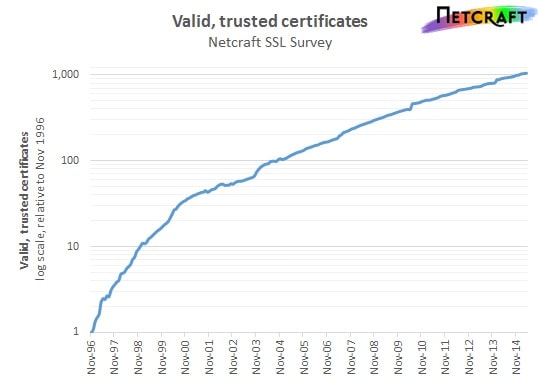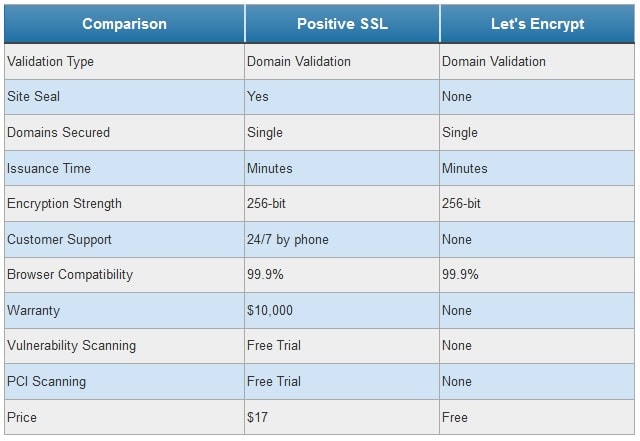December 30, 2019
You should have an SSL certificate for your website. Google continues to give bonuses to websites that have an SSL certificates since 2014, and by bonuses, I mean higher ranking in the search results. Not only does a certificate provide better ranking, it also secures your website and your visitors will feel more confident in making purchases, when they see the lock in the address bar.
Considering the growing number of fraudulent activities and also hacking attempts every day, website security has become an important concern for consumers and website owners. Consequently, SSL certificate installation has turned into a must-do for website security. SSL Certificates are not only seen as a valuable tool for website security, thus in addition, they provide a helping-hand in increasing your Search Engine Ranking Positions.
Netcraft’s SSL Server Survey has been operating since 1996 and has tracked the evolution of this marketplace from its inception — there are now more than one thousand times more certificates on the web now than in 1996.

Source: Netcraft.com
What is an SSL certificate?
An SSL Certificate (Secure Sockets Layer), also referred to as a Digital Certificate, produces a secure link among a website and a visitor’s web browser by ensuring that all data transferred between the two stays private and secure. SSL security helps prevent online hackers from stealing personal information such as names, addresses, and personal banking information. Should you sell services or products on your website and accept credit cards online, you will need an SSL Certificate for website security.
Exactly what information does an SSL certificate consist of?
SSL certificates include:
- The domain name which the SSL certificate was issued for
- The person, organization, or device it was issued to
- Which certificate authority issued it
- The certificate authority’s digital signature
- Associated subdomains
- Issue date of the certificate
- Expiration date of the certificate
- The public key
What is the difference between Free and Paid SSL certificate ?
Free SSL certificates such as Let’s Encrypt are readily available for free, and you may ask, why would you pay for one? The actual encryption process, there is no difference amongst a certificate issued by Let’s Encrypt or one from a commercial provider, such as Comodo SSL.
On the other hand, there are numerous explanations why Let’s Encrypt cannot compete with a paid SSL Certificate:
1. Validation Levels
You can find three standard types of SSL Certificates available from commercial Certificate Authorities (CA): domain validation (DV), organization validation (OV) and extended validation (EV). Domain Validation SSL Certificates (DV) provide a cost-effective and fast way to implement SSL to your site. Domain Validated (DV) certificates verify and confirm you own the domain name, though they will not carry out any additional organization level validation.
Organization Validated SSL Certificates (OV) offer immediate identity verification and powerful SSL security for your website and online business.EV SSL is an Extended Validation Certificate, the best class of SSL on the market today and provides much more credibility and trust aimed at your website when compared with having an organization or domain validated SSL Certificate.
Free SSL certificates such as Let’s Encrypt can only offer DV certificates. This could be good enough for many websites, although if you are after a higher level of verification with increased trust, you will need to look for a premium type of SSL Certificate.
2. Warranty
Premium SSL Certificates should come with a warranty – basically a type of insurance against the improbable event of certificate failure, fraudulent transactions and end users taking a loss. Warranty value starts off from $10,000 and can go up to $1,700,000 based on the type of SSL Certificate.
Let’s Encrypt certificates do not provide any kind of warranty.
3. Trust Site Seal
Premium SSL Certificates include a trust seal that you could incorporate into your website which has been shown to improve visitor confidence and conversions rates. Let’s Encrypt certificates will not provide any kind of website seal.
Let’s Encrypt User Stats
Let’s Encrypt is a non-profit certificate authority that was launched on November 18, 2014 and operate by Internet Security Research Group which offers X.509 certificates for Transport Layer Security encryption free of charge. The certificate is valid for 3 months, where renewals can take place at any time.
Source: Let’s Encrypt
Comparison: Positive SSL vs Let’s Encrypt

Final
While Let’s Encrypt is still fairly new, the winner in comparison is clearly Positive SSL as they have much more to offer. If you own a small fitness website, you could get away without owning an SSL certificate, however if you have an online ecommerce store, then a paid SSL is a must.
Buy an SSL Certificate Now

